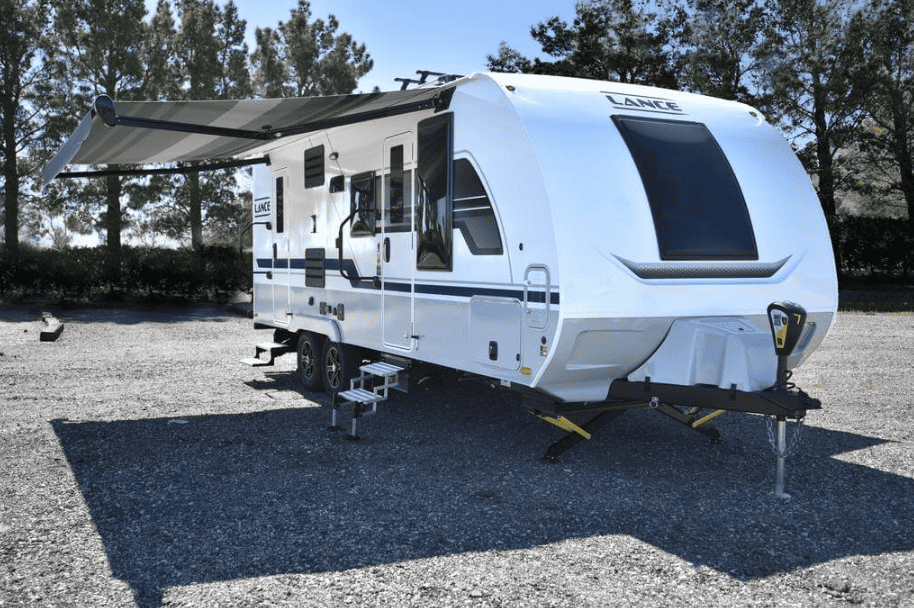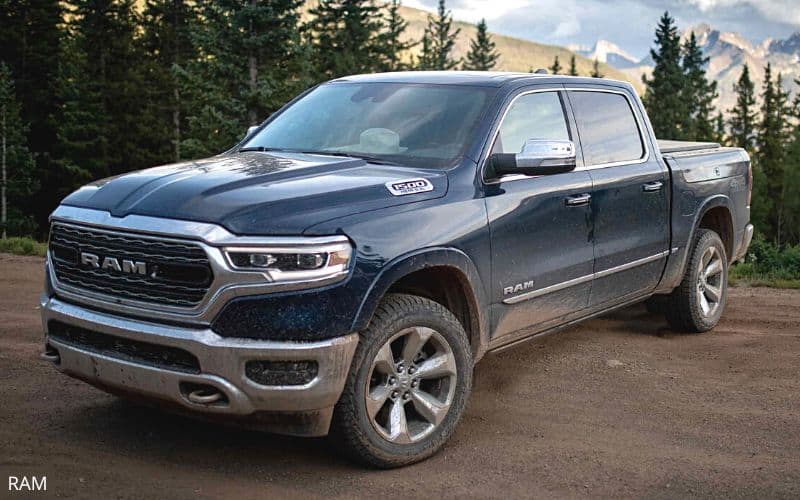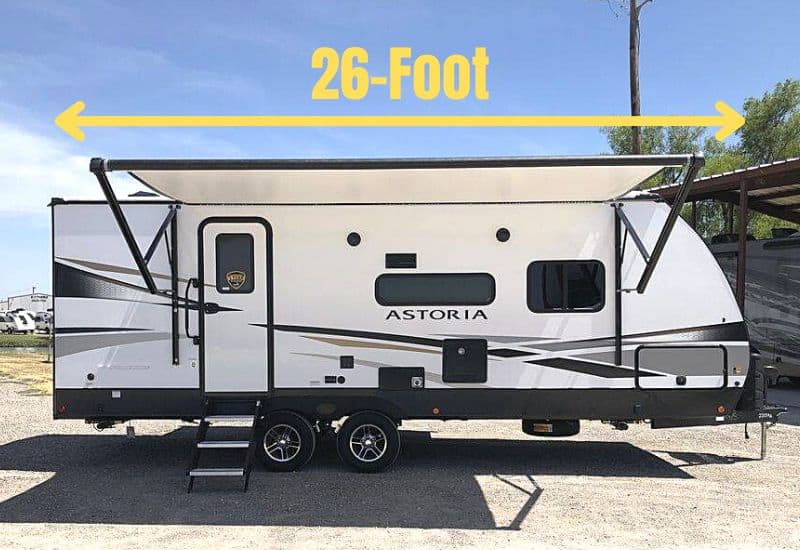Travel trailers are one of the best ways to tour this amazing country, as they allow you to return to the outdoors, travel at your own pace, and save money while traveling.
Before hitting the road though, you need to find a travel trailer size that’s right for your needs and tow vehicle.
As it’s important to choose a trailer with an unloaded and loaded weight below the max tow capacity of your vehicle.
And for many RVers, this trailer is a 26-foot travel trailer.
As this camper length provides a nice compromise between the smallest and largest travel trailers.
By providing lots of features and interior space, while still keeping the size and weight of the trailer reasonable.
You might be wondering though, if your particular tow vehicle can pull a 26-foot travel trailer.
Well, the best way to find out is to figure out how much a 26-foot camper weighs and compare it to your vehicle’s max tow capacity.
Keeping in mind the “80 Rule” for towing.
So, just how much does a 26-foot travel trailer weigh?
A 26-foot travel trailer generally has a dry weight of between 4,500 and 6,000 pounds and a fully loaded weight of between 5,000 and 6,500 pounds.
Depending on the make and model of the camper and the amount of gear loaded into the trailer.
If you’re looking for a more detailed answer, though, keep reading.
As we provide the dry weight, hitch weight, cargo carrying capacity, and gross vehicle weight rating on 15 of the most popular 26-foot travel trailers below.
Plus, in case you don’t already have your tow vehicle, we also provide 12 popular tow vehicles that can pull a 26-foot trailer.
How Much Does a 26-Foot Travel Trailer Weigh? (Lightest to Heaviest)
| Make/Model/Trim | Length | Dry Weight | Hitch Weight | Cargo Capacity | GVWR |
|---|---|---|---|---|---|
| 1. Forest River Grey Wolf 22MKSE | 26′ 9″ | 4,341 lbs | 585 lbs | 3,244 lbs | 7,585 lbs |
| 2. KZ-RV Sportsmen SE 231BHKSE | 26′ 5″ | 4,860 lbs | 580 lbs | 1,140 lbs | 6,000 lbs |
| 3. Coachmen Apex Ultra-Lite 211RBS | 26′ 2″ | 5,062 lbs | 630 lbs | 1,938 lbs | 7,000 lbs |
| 4. Heartland Sundance Ultra Lite 231ML | 26′ 11″ | 5,090 lbs | 532 lbs | 2,410 lbs | 7,532 lbs |
| 5. Grand Design RV Imagine XLS 22MLE | 26′ 1″ | 5,176 lbs | 490 lbs | 1,819 lbs | 6,995 lbs |
| 6. Jayco Jay Feather 21MML | 26′ | 5,185 lbs | 585 lbs | 1,315 lbs | 6,500 lbs |
| 7. Coachmen Northern Spirit 2252MD | 26′ 11″ | 5,200 lbs | 696 lbs | 2,400 lbs | 7,600 lbs |
| 8. Crossroads RV Sunset Trail SS222RB | 26′ 11″ | 5,298 lbs | 658 lbs | 2,302 lbs | 7,600 lbs |
| 9. Lance Travel Trailer 2185 | 26′ 1″ | 5,345 lbs | 915 lbs | 2,555 lbs | 7,900 lbs |
| 10. Keystone RV Passport SL 221BH | 26′ 4″ | 5,382 lbs | 685 lbs | 1,618 lbs | 7,000 lbs |
| 11. KZ-RV Connect C221FKKSE | 26′ 8″ | 5,490 lbs | 860 lbs | 1,510 lbs | 7,000 lbs |
| 12. Dutchmen Aspen Trail 2260RBS | 26′ 11″ | 5,577 lbs | 565 lbs | 2,023 lbs | 7,600 lbs |
| 13. Dutchmen Astoria 2203RB | 26′ 10″ | 5,762 lbs | 748 lbs | 3,139 lbs | 8,901 lbs |
| 14. Forest River Salem 22RBS | 26′ 11″ | 5,928 lbs | 765 lbs | 1,837 lbs | 7,765 lbs |
| 15. Outdoors RV Timber Ridge 22FQS | 26′ 8″ | 6,150 lbs | 660 lbs | 3,845 lbs | 9,995 lbs |
Travel Trailer Weights Explained
Before going any further, it’s important to take a few minutes to explain the different travel trailer weights.
So that everyone is on the same page.
As it’s important to understand not only how much the trailer weighs but also all the other weights associated with the trailer as well.
As these weights will not only affect towing but also the type of vehicle needed to pull the camper.
Generally, there are five main trailer weights to be concerned with, including dry weight, fully loaded weight, cargo carrying capacity, hitch weight, and the gross vehicle weight rating of the trailer.
So for a better idea of how each of these weights affects the trailer and the tow vehicle, let’s take a closer look at each, starting with dry weight.
Travel Trailer Dry Weight
The dry weight or unloaded vehicle weight of a travel trailer references its weight without any cargo, fluids, or personal belongings.
It represents the weight of the trailer as it comes from the factory, which is why it’s also sometimes referred to as the factory weight.
This weight does not include water, propane, fuel, or any other gear you may carry while camping and traveling.
Dry weight is a good baseline number to know when choosing a travel trailer, as it’s a good starting point for determining the towing capacity needed.
In addition, it also affects factors like fuel efficiency and handling on the road.
You need to know more than the trailer’s dry weight though to determine if a tow vehicle can pull the trailer.
Leading us to the next important weight to know, which is the fully loaded weight of the trailer.
Travel Trailer Fully Loaded Weight
The fully loaded weight of a travel trailer is the combined weight of the trailer and everything loaded into it, including camping gear, water, propane, batteries, etc…
This is perhaps the most important weight to know, as it reflects the true weight your tow vehicle will be pulling.
A travel trailer’s loaded weight can be challenging to figure out though, as it depends on how much gear you plan to bring along while traveling.
As a general rule though, you should plan on adding at least 500 pounds to the dry weight of a trailer, for a modest load out.
And potentially much more, if you’re a heavy packer or plan to travel with the RV tanks full or partially full.
When it comes to the amount of cargo weight a trailer can handle though not all trailers are created equal.
Leading us to our next trailer weight, cargo carrying capacity.
Travel Trailer Cargo Carrying Capacity
A travel trailer’s cargo carrying capacity (CCC) or payload capacity, is the maximum cargo weight the trailer can safely handle in addition to its own weight.
It’s important to never exceed the cargo-carrying capacity of a trailer, as it can put excessive strain on the trailer’s axles, tires, and other components.
Which can compromise the handling, stability, and road safety of the trailer.
Travel Trailer Hitch Weight
A trailer weight that’s often overlooked is hitch weight or tongue weight, which is the downward force placed on the hitch ball of the towing vehicle by the front of the trailer.
Or put another way, the weight the trailer’s tongue or hitch places on the towing vehicle’s hitch receiver.
This is a big mistake though, as a trailer’s hitch weight is very important.
As you never want to exceed the tow vehicle’s max hitch weight, just like you don’t want to exceed its max tow capacity.
As the hitch weight can affect the stability and handling of the entire towing setup.
And plays a significant role in balancing the weight distribution between the towing vehicle and the trailer.
Helping to ensure safe and controlled towing, and minimizing the risk of swaying, fishtailing, or loss of control.
Travel Trailer Gross Vehicle Weight Rating
The last important weight to know is the trailer’s gross vehicle weight rating (GVWR), which refers to the maximum allowable weight for the trailer, including its own weight and any cargo loaded into the trailer.
The GVWR is determined by the trailer’s manufacturer and based on the structural capacity of the trailer’s axles, tires, frame, and other components.
And as is the case with all other trailer weights, it’s important to never exceed the trailer’s gross vehicle weight rating.
As exceeding the weight can lead to safety hazards and potential damage to the trailer and or towing vehicle.
What Affects the Weight of a 26-Foot Travel Trailer?

While you might think that all 26-foot travel trailers have a very similar weight, due to their similar length, this is not always the case.
As there can be as much as a 1,500-pound difference between the lightest and heaviest 26-foot campers.
Which can have a big impact on the type of vehicle you need to tow the trailer.
So, if you’re trying to stay on the lower end of the weight range, we thought it would be helpful to highlight some of the biggest impacts on a trailer’s weight.
Construction
One of the biggest factors that can affect the weight of a travel trailer is its construction.
As there are a wide variety of RV building techniques and methods used to produce RVs, all of which can impact weight.
Including but not limited to the RVs frame and structure, chassis and suspension, and wall and roof materials.
RV Slides
The next biggest factor that can impact a trailer’s weight is whether the camper is equipped with a slide-out.
As even one RV slide can add significant weight to the trailer, often adding around 800 pounds.
Floorplan or Layout
The floorplan of a camper can also have a big impact on its weight affecting everything from the trailer’s total weight to its weight distribution, and hitch weight.
For example, a front kitchen layout will have a large impact on the trailer’s weight distribution and add significant hitch weight.
To see different 26-foot camper floorplans and how this affects their weight, check out our blog post “10 Popular 26-Foot Travel Trailer Floor Plans”.
Amenities and Features
One of the last big impactors of weight on a travel trailer is the type and amount of features the camper offers.
For example, if the trailer is outfitted with more interior cabinetry, an outdoor kitchen, an outdoor entertainment center, or a bigger AC, this can add several hundred pounds of weight to the trailer.
How Does the Weight of a 26-Foot Trailer Compare to Other Trailer Lengths?
Generally speaking, the longer the trailer, the heavier it will be.
This knowledge doesn’t do you much good though, if you’re trying to figure out how big of a trailer you can pull with a particular tow vehicle.
So to provide some general guidance on travel trailer length and weight, we’ve highlighted some of the most popular trailer lengths below and their corresponding weight ranges.
| Travel Trailer Length | Average Dry Weight |
|---|---|
| 18-Foot Travel Trailers | 2,000 – 3,000 lbs |
| 20-Foot Travel Trailers | 2,500 – 4,000 lbs |
| 22-Foot Travel Trailers | 3,000 – 4,500 lbs |
| 24-Foot Travel Trailers | 3,500 – 5,000 lbs |
| 26-Foot Travel Trailers | 4,500 – 6,000 lbs |
| 28-Foot Travel Trailers | 5,000 – 6,500 lbs |
| 30-Foot Travel Trailers | 5,500 – 7,000 lbs |
| 40-Foot Travel Trailers | 8,000 – 11,000 lbs |
What Vehicles Can Tow a 26ft Travel Trailer?

Due to the larger size and heavier weight of a 26-foot travel trailer, a more substantial tow vehicle, such as a full-size SUV or a half-ton truck is required to pull the trailer.
As small or mid-size SUVs and small pickup trucks don’t have enough towing capacity to safely pull a 26-foot camper.
If you’re looking for specific examples of vehicles that will safely tow a 26-foot trailer though, we’ve got you covered.
As we’ve provided a list of some of the most popular options below.
Popular Vehicles that Can Pull a 26-Foot Travel Trailer & Their Max Tow Capacities
- Ford Expedition – 5,900 to 6,000 Pounds
- Ford F-150 – 5,000 to 11,300 Pounds
- GMC Canyon – 6,000 Pounds
- Dodge RAM 1500 – 6,180 to 8,330 Pounds
- Nissan Frontier – 6,230 to 6,720 Pounds
- Lincoln Navigator – 6,200 to 8,300 Pounds
- Dodge Durango – 6,200 to 8,700 Pounds
- Chevrolet Suburban 7,400 to 7,800 Pounds
- Ford Ranger – 7,500 Pounds
- Cadillac Escalade – 7,500 to 7,700 Pounds
- Nissan Armada – 8,500 Pounds
- Chevrolet Silverado 1500 – 8,900 to 11,000 Pounds
Recent Posts
When cruising down the highway in your RV, the last thing you want is a tire blowout! Not only is it dangerous, but RV tire replacement isn't cheap, costing $200 to $300 per tire. The good news,...
Nothing ruins an RV adventure faster than a breakdown with no way to fix it. Because of this, every RVer should have a well-stocked RV tool kit for those unexpected roadside emergencies and campsite...

